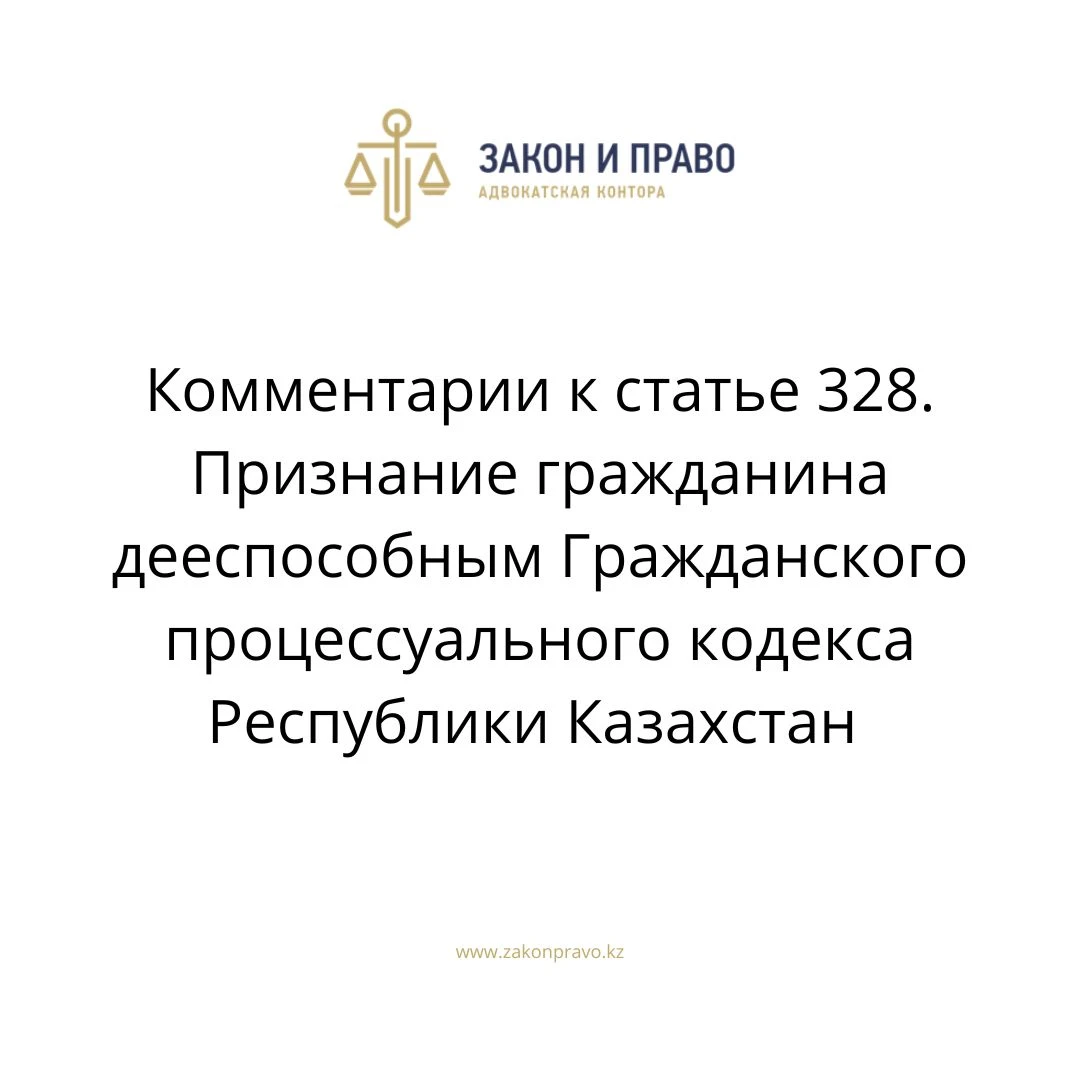Comments on Article 328. Recognition of a citizen as legally capable of the Civil Procedure Code of the Republic of Kazakhstan
1. In the cases provided for by paragraph two of Article 22, paragraph two of Article 27 of the Civil Code of the Republic of Kazakhstan, the court, at the request of the citizen himself, a member of his family, a close relative, a trustee, a body performing the functions of guardianship or guardianship, a psychiatric dispensary, shall decide on the abolition of the restriction of the citizen's legal capacity, on the abolition of restrictions or the abolition of deprivation a minor between the ages of fourteen and eighteen has the right to independently manage his earnings, scholarship or other income. On the basis of a court decision, the guardianship established over him is revoked.
2. In the cases provided for by paragraph three of Article 26 of the Civil Code of the Republic of Kazakhstan, the court, at the request of a guardian, a psychiatric medical institution, a family member, a close relative, a prosecutor, a psychiatric (neuropsychiatric) institution, a body performing guardianship or guardianship functions, on the basis of an appropriate conclusion of a forensic psychiatric examination, makes a decision to recognize the recovered or having a significant improvement in the health of a person capable of acting. On the basis of a court decision, the guardianship established over a citizen is revoked.The procedural procedure for judicial review of cases on the recognition of a citizen as legally capable is regulated by the commented article. The inclusion of the norms of the commented article in Chapter 35 of the CPC determines the subordination of the consideration of cases on the recognition of a citizen as legally capable with the procedural procedure for the consideration of the above three categories of cases. The recognition of a citizen as legally capable is not an independent category of cases, but is an auxiliary legal mechanism for correcting the impact of the court on the legal capacity of citizens.
This is important in order to rely as much as possible on the requirements established by the CPC regarding the filing of an application, evidence, the procedure for considering cases and making decisions in cases of recognizing a citizen as having limited legal capacity, recognizing a citizen as legally incompetent, restricting or depriving a minor between the ages of fourteen and eighteen of the right to independently manage his income.
The issue of proof and judicial justification in the decision is to establish the presence or absence of grounds that led to the issuance of a court decision in cases of recognition of a citizen as having limited legal capacity, recognition of a citizen as legally incompetent, restriction or deprivation of a minor between the ages of fourteen and eighteen of the right to independently manage their income.
1. In the event that a citizen ceases to abuse alcoholic beverages or narcotic substances, the court cancels the restriction on his legal capacity (paragraph 2 of Article 27 of the Civil Code). The same consequences are caused by the termination by a citizen of the use of psychotropic substances or their analogues. By analogy, the issue of restoring the full partial legal capacity of a minor should be resolved.
The first part of the commented article defines the circle of persons who have the right to file an application for recognition of a citizen as legally capable, in cases where a decision was previously made on cases of recognition of a citizen as having limited legal capacity, restriction or deprivation of a minor aged from fourteen to eighteen years of the right to independently manage their income. On the basis of a court decision, the guardianship established over him is revoked.
2. In accordance with paragraph 3 of Article 26 of the Civil Code, in the event of recovery or significant improvement in the health of an incapacitated person, the court recognizes him as legally capable. A guardian, a psychiatric medical institution, family members, close relatives, a prosecutor, a psychiatric (neuropsychiatric) institution, a body performing guardianship or guardianship functions have the right to file an application for recognition of an incapacitated citizen as legally capable, based on the relevant conclusion of a forensic psychiatric examination. On the basis of a court decision, the guardianship established over a citizen is revoked.
LIBRARY OF THE SUPREME COURT OF THE REPUBLIC OF KAZAKHSTAN
Astana, 2016
UDC 347 (574)
By 63
ISBN 978-601-236-042-4
Constitution Law Code Standard Decree Order Decision Resolution Lawyer Almaty Lawyer Legal service Legal advice Civil Criminal Administrative cases Disputes Defense Arbitration Law Company Kazakhstan Law Firm Court Cases


